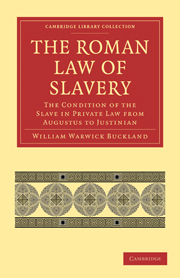Book contents
- Frontmatter
- PREFACE
- Contents
- ERRATA, ADDENDA, AND LIST OF ABBREVIATIONS
- LIST OF PRINCIPAL ABBREVIATIONS
- PART I CONDITION OF THE SLAVE
- CHAPTER I Definition and General Character
- CHAPTER II The Slave as Res
- CHAPTER III The Slave as Res (cont.). Sale of Slaves
- CHAPTER IV The Slave as Man. Non-Commercial Relations
- CHAPTER V The Slave as Man (cont.). Non-Commercial Relations (cont.). Delicts by Slaves
- CHAPTER VI The Slave as Man (cont.) Commercial Relations apart from Peculium. Acquisitions
- CHAPTER VII The Slave as Man (cont.). Commercial Relations apart from Peculium. Liabilities
- CHAPTER VIII The Slave as Man (cont.). Commercial Relations. Peculium. Acquisitions, Alienations, etc
- CHAPTER IX The Slave as Man (cont.). Commercial Relations. Peculium (cont.). Liabilities
- CHAPTER X Special Cases
- CHAPTER XI Special Cases (cont.)
- CHAPTER XII Special Cases (cont.)
- CHAPTER XIII Special Cases (cont.)
- CHAPTER XIV Special Cases (cont.)
- CHAPTER XV Special Cases (cont.)
- CHAPTER XVI Special Cases (cont.)
- PART II ENSLAVEMENT AND RELEASE FROM SLAVERY
- APPENDIX I The relation of the contractual actions adiectitiae qualitatis to the Theory of Representation
- APPENDIX II Formulation and Litis Consumptio in the actions adiectitiae qualitatis
- APPENDIX III Form used by Slave in acquisition by Mancipatio, etc.
- APPENDIX IV The essential character of Manumission: Iteratio
- APPENDIX V Manumission vindicta by a, filiusfamilias
- INDEX
CHAPTER IX - The Slave as Man (cont.). Commercial Relations. Peculium (cont.). Liabilities
Published online by Cambridge University Press: 07 September 2010
- Frontmatter
- PREFACE
- Contents
- ERRATA, ADDENDA, AND LIST OF ABBREVIATIONS
- LIST OF PRINCIPAL ABBREVIATIONS
- PART I CONDITION OF THE SLAVE
- CHAPTER I Definition and General Character
- CHAPTER II The Slave as Res
- CHAPTER III The Slave as Res (cont.). Sale of Slaves
- CHAPTER IV The Slave as Man. Non-Commercial Relations
- CHAPTER V The Slave as Man (cont.). Non-Commercial Relations (cont.). Delicts by Slaves
- CHAPTER VI The Slave as Man (cont.) Commercial Relations apart from Peculium. Acquisitions
- CHAPTER VII The Slave as Man (cont.). Commercial Relations apart from Peculium. Liabilities
- CHAPTER VIII The Slave as Man (cont.). Commercial Relations. Peculium. Acquisitions, Alienations, etc
- CHAPTER IX The Slave as Man (cont.). Commercial Relations. Peculium (cont.). Liabilities
- CHAPTER X Special Cases
- CHAPTER XI Special Cases (cont.)
- CHAPTER XII Special Cases (cont.)
- CHAPTER XIII Special Cases (cont.)
- CHAPTER XIV Special Cases (cont.)
- CHAPTER XV Special Cases (cont.)
- CHAPTER XVI Special Cases (cont.)
- PART II ENSLAVEMENT AND RELEASE FROM SLAVERY
- APPENDIX I The relation of the contractual actions adiectitiae qualitatis to the Theory of Representation
- APPENDIX II Formulation and Litis Consumptio in the actions adiectitiae qualitatis
- APPENDIX III Form used by Slave in acquisition by Mancipatio, etc.
- APPENDIX IV The essential character of Manumission: Iteratio
- APPENDIX V Manumission vindicta by a, filiusfamilias
- INDEX
Summary
ACTIO DE PE CULIO.
We have seen that the actio de in rem verso was one with the actio de peculio; i.e. that a creditor suing on a slave's contract could claim to be paid out of what had been devoted to the purposes of the master, and, if that did not suffice, out of the peculium of the slave in question. The actio de peculio can, however, be treated as an independent action of which we can now state, by way of preliminary, the general principles. We know that the dominus is liable so far as the peculium will go, upon the slave's negotia, that the action is based on the Edict, and that, in point of form, an important characteristic is that the formula contains, probably in the condemnatio, a limitation or taxatio, in the words dumtaxat de peculio, or the like.
The liability is in a sense not of the master but of the peculium. Though, in view of legacies of it, the term peculium must have already had a legal meaning, there can be no doubt that the introduction of this action gave precision to the conception, since the liability is based on the existence and independence of the peculium. The practical meaning of this proposition is that it is essential to the claim that there be a peculium: if there be none there is no action. It does not depend on voluntas domini, and thus it is not barred by the master's prohibition to trade, or by the fact that he is a pupillus.
- Type
- Chapter
- Information
- The Roman Law of SlaveryThe Condition of the Slave in Private Law from Augustus to Justinian, pp. 207 - 238Publisher: Cambridge University PressPrint publication year: 2010First published in: 1908



